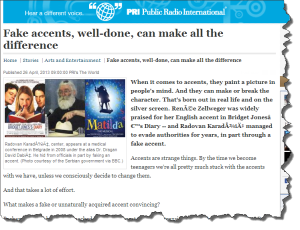The topic of speaking with an accent (or without one) isn’t new to 8Asians). I talked about my own experiences of how others had their own preconceptions of who I was based on how I spoke in this 8Asians article.
PRI (Public Radio International), recently tackled a similar topic, with regard to how convincing an actor could make a fake accent, and whether they could do it well enough to convince a native they too were a native speaker. While that portion of the segment was interesting, it was an example of how we have preconceptions based on accent that they used near the end of the piece that I found most interesting.
The scenario from the PRI piece:
Here’s almost the opposite situation: you’re not among native speakers of your accent and you’re not intending to deceive anyone — but they are nonetheless deceived. That happened to Gary Younge when he was researching a book about being an outsider in the United States. Younge was visiting a school in Mississippi. The school was largely segregated, to the point that it had a black principal and a white principal.
Young wanted to interview both principals. Only the white guy agreed to speak with him. He said he’d be delighted to have an Englishman visit. But then he was shocked to find out that this Englishman was black. “His jaw dropped,” Younge said. “He didn’t really know how to deal with it.”
Later in the day, Younge ran into the black school principal.
“He said, ‘Didn’t you call me the other day?” And I said, ‘Yeah.’ And he said, ‘I thought you were white,’” Younge recalled. There no deception in these encounters, no fake personas. But in a phone conversation, you can’t see the accent. It can paint an illusory picture.
It parallels my own experiences when speaking with a primarily neutral American accent. After hearing me talk, no one can imagine I speak or know any Chinese, much less Taiwanese, and it’s automatically assumed I’m an ABC (American Born Chinese). I recently mentioned to fellow writer Akrypti, that I felt like I straddled the line between ABC and FOB (Fresh Off the Boat) in reference to her article The ABC and FOB Divide
, and certainly plenty of people make assumptions about me based on whether they hear me speak English or Chinese first.
I had a sort of a parallel experience with regard to appearance rather than speech. I happened to have the opportunity to be in Singapore for the first time in my life earlier last month. Singapore’s an interesting country because the main language spoken is English, followed closely by Mandarin Chinese, then Malay, and Tamil. I was told by many that English is the preferred language, so it surprised me that in every shop and restaurant I went into, I was approached and spoken to in Mandarin Chinese before I had the chance to speak. I guess I must look like a typical Chinese-speaking person. And so yes, appearances also cause preconceptions. I’m not sure how or if I could have made myself look more American rather than a Chinese national (which is what I’ve been told by locals that most people I encountered probably assumed about me).
We’ll probably never live in a world where we don’t get judged by the way we look or the way we talk, and some of us will even “fake” the way we talk to be perceived differently, like the actors in the PRI piece.








